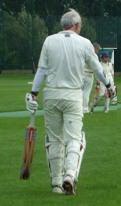 |
| Anton Late Call-off |
Whatever the reason, it is at this time of the season that FB seeks inspiration in the works of the great Russian dramatist Anton Late Call-off.
Call-off is frequently confused with his great contemporary Anton Pavlovich Chekhov (1860-1904), perhaps FB’s all time favourite playwright even though cricket is not featured in his work. But Call-off’s work, if less well known than Chekhov's, is worthy of a cricketer’s attention. His plays are tragic and comic, stuffed with character studies and redolent with descriptions of societies in transition. They provide profound insights into the human condition and the circumstances facing every cricket club. Here is a summary of his greatest plays:
The Three Sisters – The sisters are bored in a provincial town and dream of life elsewhere where they will be fulfilled. ‘Next year Moscow’ they say to each other at various points throughout the play as the everyday reality of their situation and the social nexus in which they live conspires to make escape impossible. Their house is mortgaged by their brother and his wife asserts domination of the home. The officers and soldiers who made their lives entertaining leave, there is a fire in the town. At repeated points in the action the sisters receive texts from friends and possible lovers to tell them that they are no longer available and have to call off from tomorrow’s fixture.
The Cherry Orchard - The play concerns an aristocratic Russian woman and her family as they return to the family's estate (which includes a large and well-known cherry orchard) just before it is auctioned to pay the mortgage. While presented with options to save the estate, the family does nothing for reasons of misplaced pride in their status or apathetic procrastination. The play ends with the estate being sold to the son of a former serf, but just as he is about to chop the cherry orchard down he texts them say he is no longer available and has to call-off from tomorrow’s fixture.
The Seagull - Why is it you always wear black? - I’m in mourning for my life. I’m unhappy.
Perhaps the greatest opening lines in drama, but they were discarded by Call-off who revised them to say Why is it you always wear pads? – I want to bat number 3 but am always 11. I’m unhappy.
In this play Constantine Treplef, seeks new forms of expression. He is tired of the old academic ways, dismissive of convention and despairs that no one apparently capable of an original thought. He has written a play; the principal part is to be acted by Nina, a beautiful girl with whom he is in love. He arranges the first performance to take place on the occasion of his mother's, a famous actress, holiday in the country. There is tension between her superficiality and Constantine’s earnest vision. At the climax of the drama just as his play is about to get underway, Constantine receives a text from Nina in which she says she is no longer available and has to call-off from tomorrow’s fixture.
Anton Late Call-off – Test Match Quality

No comments:
Post a Comment